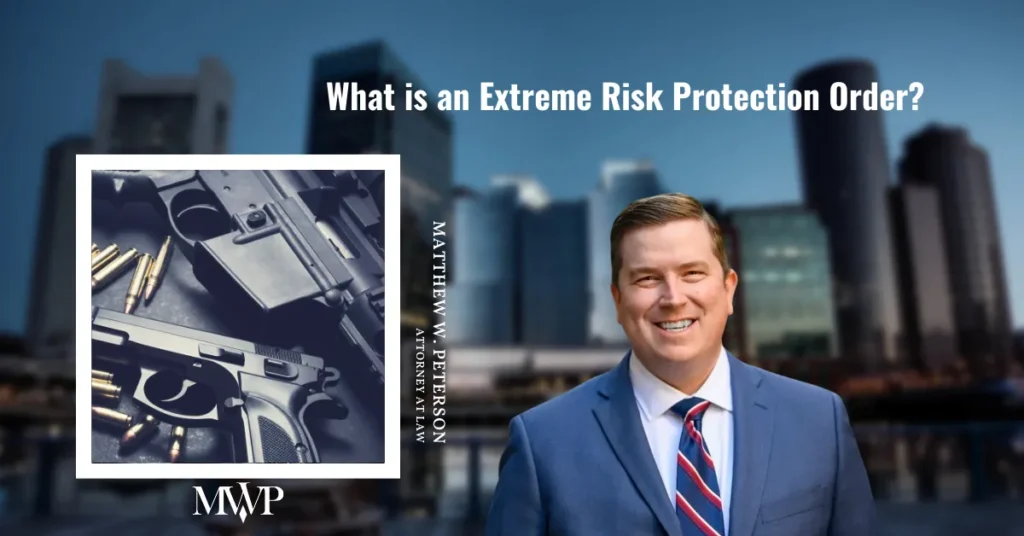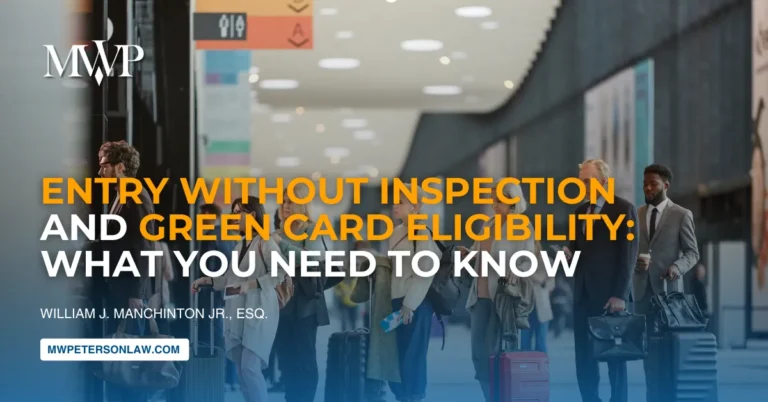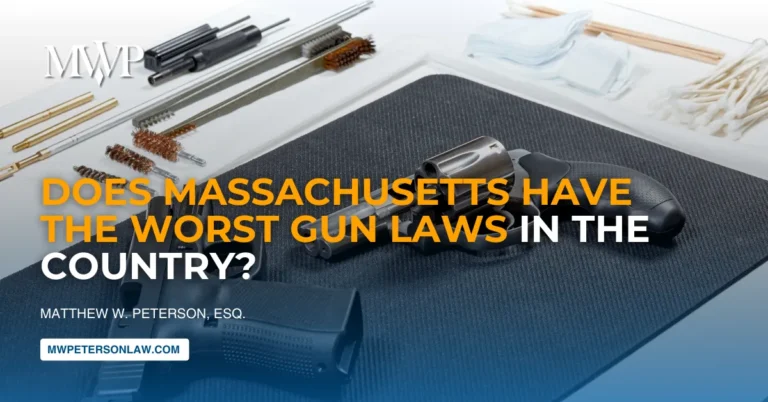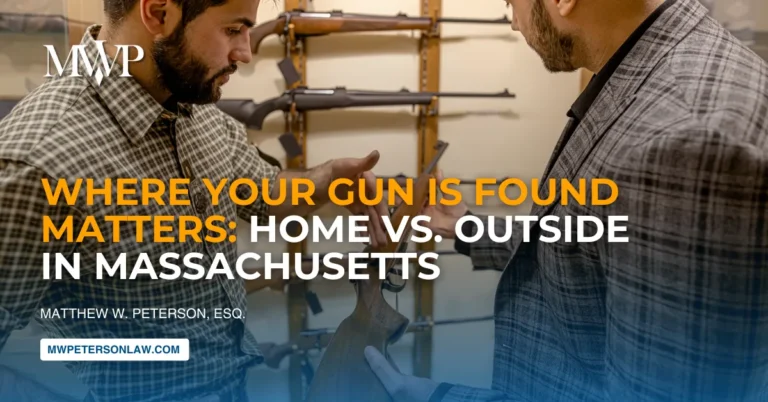Extreme Risk Protection Order (ERPO), also known as the “red flag” law, allows someone to take away your gun rights without you even having the chance to be heard. This blog post aims to provide a comprehensive overview of ERPOs, their implications, and what you as a gun owner need to know. We are here to help you navigate this complex legal landscape and ensure your rights are protected. Call or text the Law Office of Matthew W. Peterson at 617-295-7500.
What is an Extreme Risk Protection Order?
An Extreme Risk Protection Order is a legal mechanism designed to temporarily remove firearms from individuals who are deemed to pose a risk to themselves or others. These orders are often referred to as “red flag” laws. They are meant to prevent potential harm by preemptively restricting access to firearms.
ERPOs can be filed by family members, household members, law enforcement officers, healthcare providers, or school administrators. The process is intended to protect public safety, but it can sometimes lead to contentious legal battles.
How Extreme Risk Protection Orders Are Issued
Once a petition for an ERPO is filed, a court can issue the order without the firearm owner being present or being heard. This ex parte hearing allows the judge to determine whether the individual poses a risk based on the evidence presented by the petitioner.
The decision to grant an ERPO is made on a “preponderance of the evidence,” meaning the judge must find it more likely than not that the individual poses a risk. This standard is lower than “beyond a reasonable doubt,” which is required in criminal cases.
Who Can File an Extreme Risk Protection Orders?
Understanding who can file an ERPO is crucial for gun owners. The law permits the following individuals to petition the court:
- Family or household members
- Licensing authority for your License to Carry (LTC)
- Law enforcement officers
- Healthcare providers
- School administrators
Health providers and school administrators were added by the new Massachusetts gun law. Each of these parties can initiate the process, prompting the court to take immediate action to mitigate perceived risks.
What Happens After an ERPO is Filed?
After an ERPO is filed, the court can issue the order without the firearm owner’s presence. This can happen very quickly, sometimes within hours of the petition being filed. The judge reviews the evidence and decides whether the individual poses a risk of causing bodily injury to themselves or others.
If the order is granted, law enforcement will typically be tasked with confiscating the individual’s firearms. This can be a sudden and distressing experience for the gun owner, especially if they are unaware of the petition until the order is enforced.
Your Right to Contest an Extreme Risk Protection Orders
If you are served with an ERPO, it’s essential to understand that you have the right to contest the order. A hearing will be scheduled at a later date where you can present your case and argue against the order.
During this hearing, you can provide evidence and testimony to demonstrate that you do not pose a risk. It’s crucial to have legal representation during this process, as the stakes are high and the legal landscape can be complex.
The Importance of Contacting a Firearms Attorney
One of the most critical steps you can take if you receive an extreme risk protection order is to contact a firearms attorney immediately. An experienced attorney can help you navigate the legal process, gather evidence, and advocate on your behalf.
In a recent case, our firm successfully vacated an ERPO and reinstated our client’s License to Carry. The license had been revoked due to threats made by a family member. While we eventually achieved justice, we could have prevented the guns from being taken much sooner if our client had contacted us immediately.
Reopening the Hearing
Even after an initial hearing, circumstances can change. If there is a significant change in your situation, you have the right to request a motion to reopen the hearing. This allows you to present new evidence or highlight changes that may influence the court’s decision.
For example, if the petitioner withdraws their concerns or if you complete a program addressing the issues cited in the original petition, these developments can be critical in contesting the ERPO.
Real-Life Impact of Extreme Risk Protection Orders
ERPOs can have a significant impact on individuals’ lives. In the case mentioned earlier, our client faced considerable stress and inconvenience due to the temporary loss of their firearms and LTC. However, by working with a skilled firearms attorney, they were able to restore their rights and regain their peace of mind.
This example underscores the importance of timely legal intervention and the potential for positive outcomes, even in challenging circumstances.
The Legal Process of Contesting an Extreme Risk Protection Orders
Contesting an ERPO involves several steps. Initially, you will receive notice of the order and the date of the subsequent hearing. It’s essential to prepare thoroughly for this hearing, as it can determine whether the ERPO remains in effect.
Your attorney will work with you to gather evidence, identify witnesses, and build a strong case. This may involve obtaining character references, medical records, or other documentation that supports your position.
The Role of Evidence in Extreme Risk Protection Orders Hearings
Evidence plays a pivotal role in ERPO hearings. The judge’s decision is based on the preponderance of the evidence, so it’s crucial to present a comprehensive and compelling case.
This may include testimony from family members, friends, or colleagues who can attest to your character and behavior. Additionally, medical or psychological evaluations can provide valuable insights into your mental and emotional state.
Potential Consequences of an Extreme Risk Protection Orders
An ERPO can have far-reaching consequences beyond the temporary removal of firearms and loss of your gun license. It can affect your reputation, career, and personal relationships. Understanding these potential impacts underscores the importance of contesting the order effectively.
In some cases, an ERPO may lead to additional legal actions, such as criminal charges or civil lawsuits. Being proactive and seeking legal counsel can help mitigate these risks and protect your interests. It can also lead to you being found unsuitable or your gun license being denied in the future.
Extreme Risk Protection Orders, or “red flag” laws, are designed to enhance public safety by temporarily removing firearms from individuals deemed to pose a risk. However, the process can be challenging and stressful for gun owners.
If you receive an ERPO, it’s crucial to contact a firearms attorney immediately and prepare to contest the order. By understanding your rights and taking proactive steps, you can protect yourself and your legal rights.
Remember, early intervention can make a significant difference. If you or someone you know is facing an ERPO, don’t hesitate to seek legal counsel and take action to defend your rights.
For more information or to discuss your specific situation, feel free to reach out to our team of experienced firearms attorneys.











